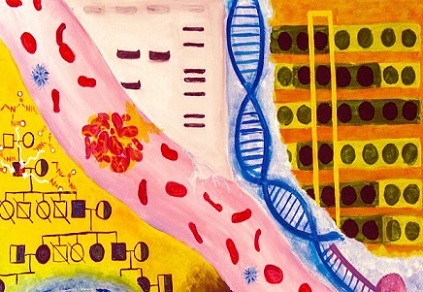Sebastian Lavoie Fact checked by:Thailand Medical News Team Sep 04, 2024 7 months, 3 weeks, 1 day, 18 hours, 54 minutes ago
Medical News: Unveiling the Genetic Factors Behind COVID-19 Severity
In a groundbreaking study conducted by researchers from Juntendo University, Tokyo, and the University of Tokyo-Japan, with collaboration from other global institutions, a deeper understanding of why some individuals with COVID-19 experience severe complications, such as thrombotic events and endothelial dysfunction, has been revealed. This
Medical News report explores the significant role of the 4G/5G gene polymorphism in the plasminogen activator inhibitor-1 (PAI-1) promoter and its impact on COVID-19 severity.
 How 4G/5G gene polymorphisms influence COVID-19 severity and thrombosis risk
What Are 4G/5G Gene Polymorphisms?
How 4G/5G gene polymorphisms influence COVID-19 severity and thrombosis risk
What Are 4G/5G Gene Polymorphisms?
Before delving into the study findings, it's essential to understand what 4G/5G gene polymorphisms are. Polymorphisms refer to variations in a particular DNA sequence among individuals. The 4G/5G polymorphism specifically occurs in the promoter region of the PAI-1 gene, a critical gene that regulates blood clot breakdown in the body.
The terms "4G" and "5G" refer to the presence of four or five guanine nucleotides in a row within this promoter region. These variations can affect how much PAI-1 protein the body produces. There are three possible genotypes: 4G/4G, 4G/5G, and 5G/5G. These genotypes influence how the body responds to certain conditions, such as inflammation and blood clotting, which are crucial in the context of COVID-19.
The Role of PAI-1 in COVID-19
Plasminogen activator inhibitor-1 (PAI-1) is a protein that plays a key role in controlling the body's fibrinolytic system, which is responsible for breaking down blood clots. During COVID-19, elevated levels of PAI-1 have been linked to an increased risk of thrombosis, which can lead to severe complications, including heart attacks and strokes. The study focused on two polymorphisms in the PAI-1 gene: the +43 G>A polymorphism and the 4G/5G promoter polymorphism.
The researchers aimed to discover how these genetic variations might influence COVID-19 severity and the risk of developing endothelial dysfunction, a condition characterized by impaired blood vessel function, which can lead to serious health issues.
Key Findings of the Study
The study involved analyzing clinical data, blood samples, and genetic information from COVID-19 patients in Japan. The researchers found that while the +43 G>A polymorphism did not show significant differences in COVID-19 severity, the 4G/5G promoter polymorphism played a crucial role.
Patients with the 4G4G genotype of the 4G/5G polymorphism were found to have higher circulating levels of PAI-1. This was particularly evident in patients who were in the complicated phase of the disease, which includes those requiring intensive care or mechanical ventilation. These patients also exhibited lower levels of plasmin, an enzyme essential for breaking down blood clots, leading to suppressed fibrinolysis - a process
that prevents blood clots from forming.
Interestingly, the study also found that the 5G5G genotype was associated with higher levels of Troponin T, a marker of heart damage, suggesting a link between this genotype and a greater risk of severe cardiovascular complications in COVID-19 patients.
The Genetic Basis of COVID-19 Severity
The study's findings highlight the significant role of genetic factors in determining the severity of COVID-19. While comorbidities such as heart disease, hypertension, and diabetes were found to be equally distributed across different genotypes, the genetic variations in the PAI-1 promoter significantly influenced the body's response to the virus.
For patients with the 4G4G genotype, the study suggests that their genetic makeup predisposes them to higher PAI-1 levels, which, in turn, suppresses the body's ability to dissolve blood clots. This could explain why some patients develop more severe thrombotic complications and endothelial dysfunction during COVID-19 infection.
The Mechanisms Behind the Genetic Influence
The researchers conducted detailed analyses to understand the mechanisms driving these observations. They found that in COVID-19 patients with the 4G4G genotype, the transcription factor NF-kB was upregulated in peripheral blood mononuclear cells (PBMCs). This upregulation was linked to increased PAI-1 expression and reduced levels of interleukin-1β (IL-1β) and plasmin, further contributing to the suppression of fibrinolysis.
Moreover, the study highlighted that IL-1β, a pro-inflammatory cytokine, plays a significant role in enhancing PAI-1 expression in patients with the 4G4G genotype. This cytokine-induced upregulation of PAI-1 leads to a shutdown of the fibrinolytic system, making it difficult for the body to dissolve clots, thereby increasing the risk of thrombosis.
Implications for Treatment and Prevention
Understanding the genetic factors that contribute to COVID-19 severity can have profound implications for treatment and prevention strategies. For instance, patients with the 4G4G genotype may benefit from targeted therapies that address the elevated PAI-1 levels and restore fibrinolytic balance. Additionally, genetic screening for the 4G/5G polymorphism could help identify individuals at higher risk for severe complications, enabling healthcare providers to take proactive measures in managing their condition.
Conclusion: Genetic Insights into COVID-19
The study's findings provide crucial insights into the genetic factors that influence the severity of COVID-19. By identifying the role of the 4G/5G polymorphism in regulating PAI-1 levels and its impact on thrombotic risk, the research opens new avenues for personalized treatment approaches. As the global medical community continues to grapple with the challenges posed by COVID-19, such studies highlight the importance of considering genetic factors in the fight against this deadly virus.
The study findings were published in the peer-reviewed journal: Frontiers in Immunology.
https://www.frontiersin.org/journals/immunology/articles/10.3389/fimmu.2024.1445294/full
For the latest COVID-19 News, keep on logging to Thailand
Medical News.
Read Also:
https://www.thailandmedical.news/news/unveiling-the-uniqueness-of-covid-19-induced-thrombosis
https://www.thailandmedical.news/news/covid-19-news-u-s-nih-funded-study-discovers-that-sars-cov-2-spike-protein-binds-and-modulates-estrogen-receptors,-increasing-risk-of-thrombosis
